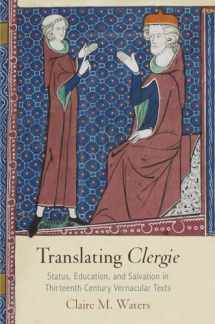
Translating "Clergie": Status, Education, and Salvation in Thirteenth-Century Vernacular Texts (The Middle Ages Series)
ISBN-13:
9780812247725
ISBN-10:
0812247728
Author:
Claire M. Waters
Publication date:
2015
Publisher:
University of Pennsylvania Press
Format:
Hardcover
312 pages
Category:
Education
,
Christian Books & Bibles
FREE US shipping
Book details
ISBN-13:
9780812247725
ISBN-10:
0812247728
Author:
Claire M. Waters
Publication date:
2015
Publisher:
University of Pennsylvania Press
Format:
Hardcover
312 pages
Category:
Education
,
Christian Books & Bibles
Summary
Translating "Clergie": Status, Education, and Salvation in Thirteenth-Century Vernacular Texts (The Middle Ages Series) (ISBN-13: 9780812247725 and ISBN-10: 0812247728), written by authors
Claire M. Waters, was published by University of Pennsylvania Press in 2015.
With an overall rating of 3.6 stars, it's a notable title among other
Education
(Christian Books & Bibles) books. You can easily purchase or rent Translating "Clergie": Status, Education, and Salvation in Thirteenth-Century Vernacular Texts (The Middle Ages Series) (Hardcover) from BooksRun,
along with many other new and used
Education
books
and textbooks.
And, if you're looking to sell your copy, our current buyback offer is $0.3.
Description
In Translating "Clergie", Claire Waters explores texts in French verse and prose from England and the Continent that respond to the educational imperative implicit in the Fourth Lateran Council's mandate that individuals be responsible for their own salvation. These texts return repeatedly to the moment of death and individual judgment to emphasize the importance of the process of teaching and to remind teacher and learner of their common fate.The texts' focus on death was not solely a means of terrifying an audience but enabled lay learners to envision confrontations or conversations with dead friends, saints, or even God. Such dialogues at the point of death reinforced the importance of the dialogue between teacher and learner in life and are represented in such varied works as doctrinal handbooks, miracles of the Virgin Mary, retellings of the Harrowing of Hell, and even fabliaux—tales of wit and reversal—in which it is possible to argue one's way into Heaven. Lively stories that featured minstrels dicing with saints, friends returning from the dead, and thieves teaching the prophets offered a model for laypeople considering how to put their Christian learning into practice and perhaps to teach others.Rather than being seen as a challenge to ecclesiastical authority, lay learning in these texts is depicted as hopeful, comic, and affectionate. By examining informal works of Christian instruction used outside institutional teaching contexts to convey the learning of the schools to the parishes, Waters shows how lay learners could assume the role of disciple or student in a way previously available only to monks or university scholars.


We would LOVE it if you could help us and other readers by reviewing the book
Book review

Congratulations! We have received your book review.
{user}
{createdAt}
by {truncated_author}


